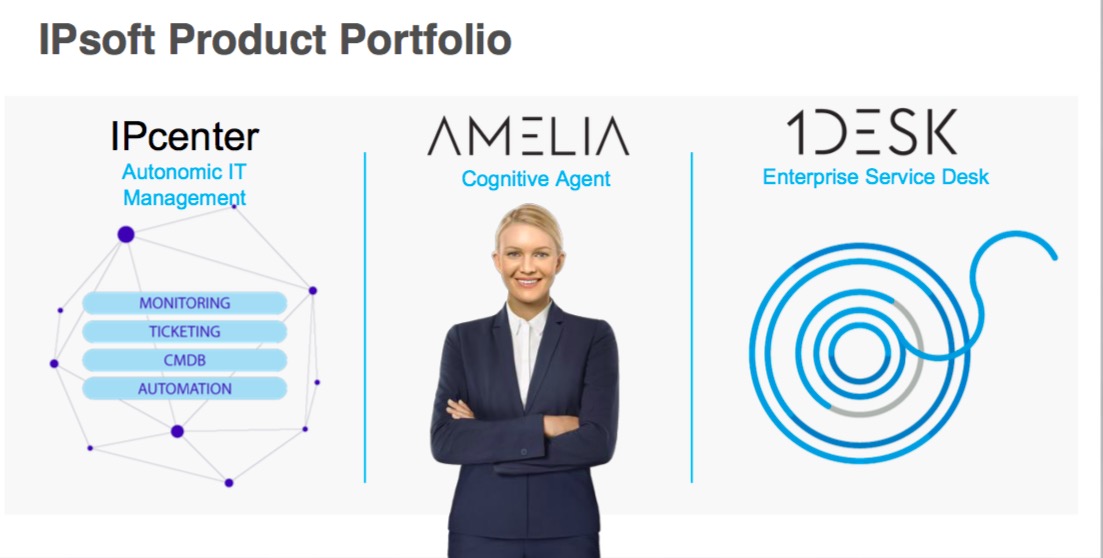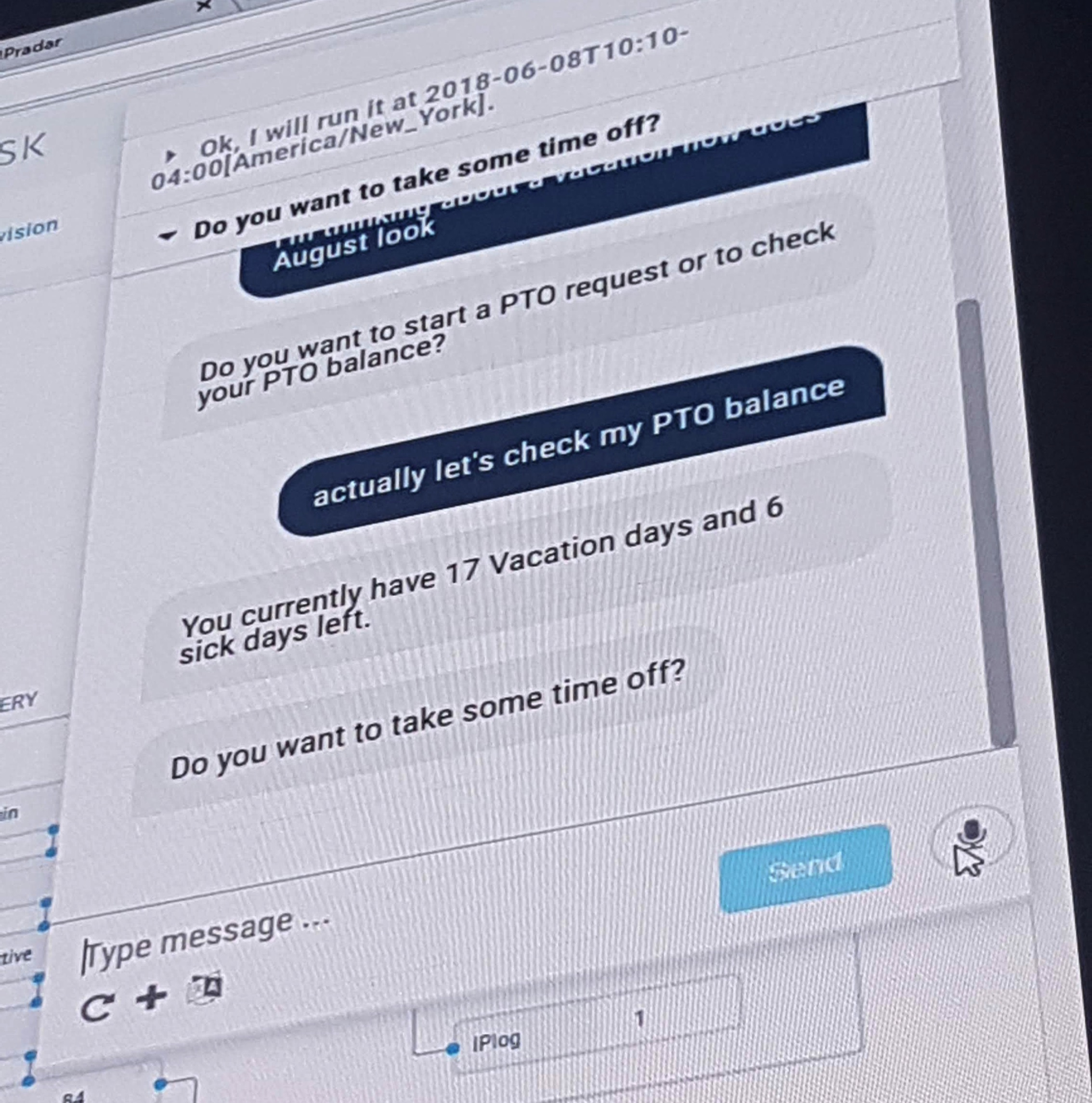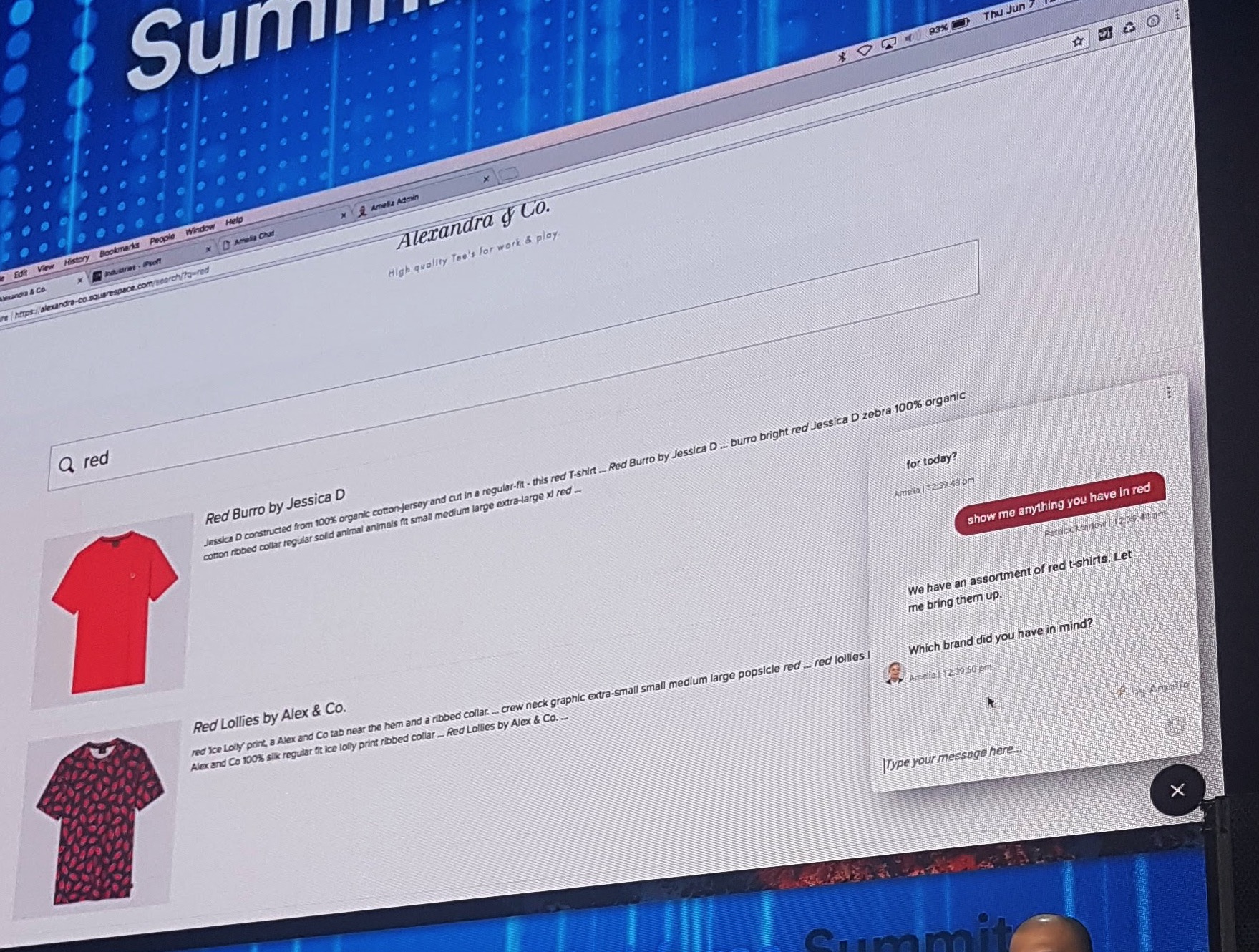Summary
- Digital Workforce Summit On June 7 IPsoft held their annual customer event in NYC, where they showcased the newest features of their digital assistant, Amelia.
- Amelia is a software platform that uses artificial intelligence to create human-like interactions for helpdesk/support experience, both with employees and customers. People usually interact with Amelia via a chat user-interface, where they enter queries and Amelia responds. What makes Amelia different than just a “Q&A chatbot” is that Amelia can understand the context of the conversation, the sentiment and even the history of the interactions making it a much more natural (and useful) conversation.
- Amelia Marketplace: Provides Amelia training skills "out of the box" in areas like banking, healthcare and insurance.
- Amelia City: Opening of IPsoft’s highly interactive customer briefing centre (at their NYC HQ) that showcases Amelia’s features and use-cases.
- 1DESK: IPsoft's new platform that bridges front-office (UI) experience with back-end (ITSM) services
We’ve all been there. An application stops working, wifi goes down, you forget a password, or you need an answer to a business process like when to enroll for benefits. Raise your hand if you loved the experience you had looking up the solution or dealing with customer service agents. I’ll wait. No hands up? I didn’t think so. The current breed of support tools are usually frustrating and challenging. Does anyone actually like using those automated phone systems? Push 1, 3, *, 7 if you do or 2, #, 5 if you don’t. How about many searching through help documentation or an FAQ for answers? You get my point.
So how do we solve these challenges? How do we get the accuracy and understanding that a human can provide, while still getting the speed, scalability and ease of use of digital solutions?
On June 7th I travelled to New York to attend IPsoft’s Digital Workforce Summit where they were discussing their vision of how support should work. Notice the event was called “Digital Workforce” not “Digital Workplace” (a very common term these days) because IPsoft develops solutions which they refer to as digital or cognitive assistants. These new “digital coworkers” are quickly becoming part of the workforce, as they help augment the capabilities of internet help desks and customer support call centres and websites.
Who is IPsoft?
IPsoft is a privately owned company, headquartered in New York City, founded in 1998. With over 2500 employees and offices in 13 countries, the company developers solutions for automating and managing IT and business solutions.
Below is an image of their product portfolio:
More Than A Chatbot, Meet Amelia
I imagine most of you reading this have at some point interacted with the growing number of “digital assistants” such as Apple Siri, Google Assistant, Microsoft Cortana or Amazon Alexa. These tools can perform a variety of actions from answering questions, to setting alarms, to interacting with appliances and lighting. But have you used such a tool at work? Vendors such as IPsoft and its competitors are hoping that as our trust and comfort with these digital assistants improves, their usage will become as common as using an ATM for doing your banking.
Amelia is more than just a chatbot or a tool that responds to a simple question by searching for the most relevant answer. IPsoft has spent more than 15 years creating a digital model that mimics many of the ways the human brain works. Amelia’s “brain” (a deeper discussion of artificial intelligence is outside the scope of this article) uses several different elements to determine how to respond to people. These include:
- Semantic Memory - this is where knowledge is stored
- Process Memory - this is where business processes and workflows are stored
- Analytical Memory - predictive models for next best actions and constant refinement for accuracy
- Episodic Memory - this is where past experiences are stored
- Affective Memory - empathy and contextual understanding
MyPOV
Think of the first three as the understanding of your business’s workflows. For example, if an employee asks how to enrol for healthcare benefits, Amelia will process the information she’s been trained on about healthcare providers, deadlines, common questions, etc. and formulate an answer. Where things get really interesting are the last two facets: experiences and empathy. Rather than just providing a generic answer, Amelia can leverage a personalized history of interactions (ex: Alan, last year you enrolled for plan A) and understand the sentiment of the question. (ex: Alan, I see you’ve submitted two claims for chiropractic work, I hope your back is feeling better) By combining these five elements, Amelia becomes more than just a “static chatbot” which gathers input and performs and query into knowledge bases to provide a generic response. This elevates Amelia beyond just 1:1 question and answer, and enables employees and customers to have more detailed conversations, ones that can become more granular, or even branch into a different direction from the original questions.
At the Digital Workforce Summit, IPsoft demonstrated two use-cases that impressed me. The first started off as a pretty standard internal helpdesk situation, where an employee had a question about vacation benefits. However, after answering a few questions Amelia then proactively asked the person of they would like to schedule paid time off, much like a real person may do when having this conversation.
The second demonstration was around customer engagement. It highlighted how Amelia can be used to help a customer find products while shopping online. Amelia is able to guide people through the buying process, asking them questions about things like size, style, colour, availability, etc. ideally leading to a more a successful “surf to sale” (ok quote to cash) experience.
Augmented Assistance Requires Industry Expertise
While there are several platforms that software developers can use to add artificial intelligence or machine learning into their applications/chatbots, for the most part they don’t provide the knowledge that is needed to train them to work in specific industries. Think of it like hiring a new employee who while skilled in their area, does not actually know anything specific about your company’s products, rules, policies, workflows, etc. You have to invest a lot of time and money training them after they are hired. Digital assistants are similar in that they are only as good as what they have been trained on and what they’ve experienced and learned from. The cost and complexity of training these digital assistants are two of the challenges that early adopters have faced. At the Digital Workforce Summit, IPsoft announced they intend to reduce these issues by providing 16 pre-trained roles for Amelia with more than 140 skills, via a new industry marketplace.
Here is a sample of the skills that IPsoft will be making available to customers using Amelia:
| Industry | Role | Skills |
| Banking |
|
|
| Insurance |
|
|
| Healthcare |
|
|
Automating ITSM with IPsoft 1Desk
One of the big announcements at the Digital Workforce summit was the launch of IPsoft 1Desk, which they describe as the “convergence of front and back-office functions into a single autonomic framework."
What this means is that automated support for employees can go beyond just “Q&A type chat conversations" with Amelia, they can now result in actions being taken to resolve the issues. For example, if an employee asks questions about wi-fi or email issues, once Amelia determines what the problem is, it can attempt to take corrective actions automatically, or at least step people through the actions they need to take, including showing screenshots or visual guides.
Building Trust, Understanding and Administration
While speaking with customers at the summit, it became clear that while they are very interested in the features that Amelia provides, one of the hurdles is in understanding the administration of “digital agents.” As with any nascent technology, companies need to know what new skills they are going to require from their IT staff, their support staff, their developers and their employees (“users”). For example, several customers told me they desire detailed analytics around what’s happening (what type of questions are being asked), what’s working well (which have high-resolution rates or times) and which processes need to be improved (where is automated response failing, what’s frustrating users, etc).
Augment, not Annihilate. Enhance not Eliminate
Any time you speak to someone about AI or automation these days, the same question always comes up… “What impact will this have on my headcount?" While it is impossible for me to give a generic answer without learning the specifics of each company, I still find it important to emphasize that solutions like Amelia are not intended to replace humans, but rather augment their ability to get their jobs done "better". Better could mean faster, more accurately, higher volume, better satisfaction, more creatively, or a host of other improvements.
Conclusion: Business not Buzzwords
One of the challenges for IPsoft and its competitors is establishing what market “digital assistants” are part of. Is it RPA? Is it IT Service/Support? Is it Customer Experience? Accurately and simply explaining to customers what problems IPsoft can solve is critical. IPsoft is doing a very good job at focusing on the “business” of automation, rather than the technology. Chief Marketing Officer Anurag Harsh gave an excellent opening keynote, where he focused mainly on “what Amelia can do” and not “how it can do it.” I find it too common these days for tech companies to get too detailed about artificial intelligence and machine learning, neural networks and training data sets, confusing customers and raising too many questions. It would be like a car salesperson telling you how the airbags work instead of just telling you that they keep you safe. Don’t get me wrong, there is a need for technical details to help customers understand scale, security and other differentiators, but I think focusing on business use-cases is always the right way to start the conversation. IPsoft is doing well with their use-case focused messaging and the amazing new Amelia City lab/briefing centre.
For further information about IPsoft’s Digital Workforce Summit, here is a short video I record while at the event:
Also, here is a customer case study my colleague Cindy Zhou and I wrote:
How SEB Bank Uses IPsoft to Increase Customer and Employee Engagement
This case study examines SEB Bank's experience implementing IPsoft's Amelia artificial intelligence (AI) platform for use by both internal employees and external customers. Since the Swedish bank deployed Amelia, which it renamed Aida, internal employees have dramatically reduced the resolution times for common IT support issues. Externally, 91 percent of the customers that used Aida rated the solution as "very good" or "good." Aida also helps customers book branch sales appointments for more-personalized service and reduced wait times.





